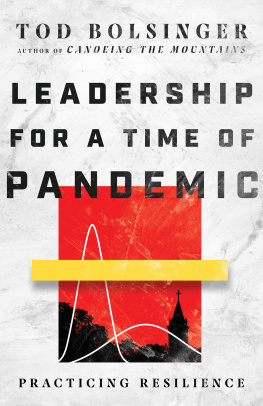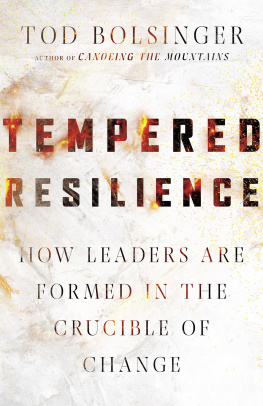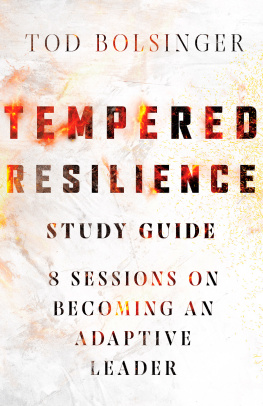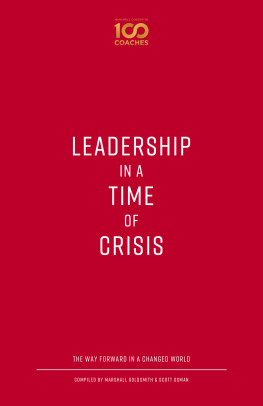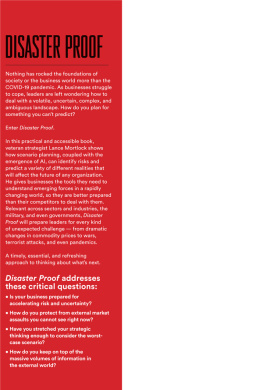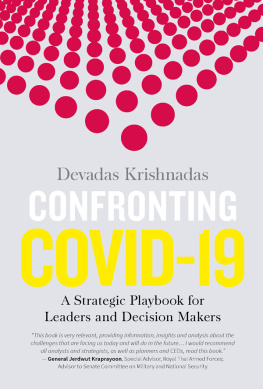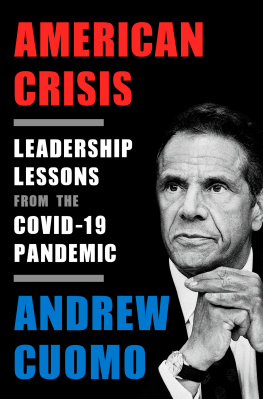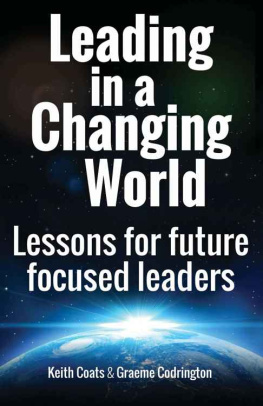Table of Contents
Pagination de l'dition papier
Guide
LEADERSHIP
FOR A TIME OF
PANDEMIC
PRACTICING RESILIENCE
TOD BOLSINGER
InterVarsity Press
P.O. Box 1400, Downers Grove, IL 60515-1426
ivpress.com
2020 by Tod E. Bolsinger
All rights reserved. No part of this book may be reproduced in any form without written permission from InterVarsity Press.
Material in this ebook is adapted from Tod E. Bolsinger, Tempered Resilience (Downers Grove, IL: InterVarsity Press, 2020), and Canoeing the Mountains (Downers Grove, IL: InterVarsity Press, 2015). Used by permission of InterVarsity Press.
InterVarsity Press is the book-publishing division of InterVarsity Christian Fellowship/USA, a movement of students and faculty active on campus at hundreds of universities, colleges, and schools of nursing in the United States of America, and a member movement of the International Fellowship of Evangelical Students. For information about local and regional activities, visit intervarsity.org.
Scripture quotations, unless otherwise noted, are from the New Revised Standard Version Bible, copyright 1989 National Council of the Churches of Christ in the United States of America. Used by permission. All rights reserved worldwide.
While any stories in this book are true, some names and identifying information may have been changed to protect the privacy of individuals.
Published in association with Creative Trust Literary Group LLC, 2006 Acklen Ave, PO Box 121705, Nashville, TN 37212-9998, www.creativetrust.com.
Cover design and image composite: David Fassett
Interior design: Daniel van Loon
Images: church steeple silhouette: GeorgePeters / DigitalVision Vectors / Getty Images
white marble floor: Sirijit Jongcharoenkulchai / EyeEm / Getty Images
ISBN 978-0-8308-2107-5 (digital)
This digital document has been produced by Nord Compo.
THE NEW UNCHARTED TERRITORY
I N LESS THAN A MONTH literally everything we assumed about what a church does changed. Sunday morning services? Small groups? Committee meetings? Programs on our church campus? All cancelledeven Easter Sunday services.
As the days of shelter-in-place turned into weeks and weeks turned into months, most experts acknowledged that the global pandemic that has led to tens of thousands of deaths is likely to be more like a little ice age than a long winter or a stormy blizzard. While churches and schools rapidly transitioned to meeting online, hopes that we would soon return to normal all quickly and worrisomely faded. As leaders hoped that our once roaring economy, bustling restaurants and bars, students in classrooms on school campuses, church sanctuaries filled with worshipers, and bank accounts filled with donations would instantly reappear, many were immediately dealing with large-scale layoffs and furloughs, devastating losses in income and investments, and the heightened anxiety of facing a future with no clear understanding at all of what that future may look like.
So now what does ministry look like in this changing world? What kind of strength, wisdom, character, and discernment do we need to lead well? How do we clarify what should never change and at the same time prepare to let go of many things that are dear to us? What does it mean to be adaptive leaders who are able to go into uncharted territory when everybody has been thrust into it at the same time? And how can we who feel the burden of leading in this unprecedented, changing world be formed for the call that we have been given?
About twelve years ago, I heard a whisper for the first time. It was a pastor who was deeply discouraged and trying to make sense of why so much effort and faithfulness seemed to bear such little fruit. Over the years I would hear it over and over again: Seminary didnt train me for this, Tod.
Back then, I was serving a congregation as their senior pastor and on a commission to prepare my denomination for the future. I had also started doing consulting and coaching in leading change with church and nonprofit leaders. On one particular day, I was stunned when three of my colleagues all resigned from their churches. There were no affairs or scandals or renunciations of faithjust three good servants all throwing in the towel, overwhelmed by the task in front of them.
The circumstances were as different as the pastors themselves, but there was one thing they all had in common: their churches were struggling because so many of the approaches and assumptions of the past were no longer working. The pastors hadnt changed their beliefs; the churches hadnt changed their values. The world around them had changed. And it was continuing to do so at an even more rapid pace.
In one generation, the place of Christianity within culture dramatically shifted as we experienced what theologians and sociologists of religion call the death of Christendom. Christendom isnt Christian faith. Christendom is the culture that supports Christian faith, giving Christianity privilege, priority, and place in our society. Christendom was the Los Angeles Times publishing a weeks worth of Bible readings in 1963, and thousands of small towns being developed with a library, courthouse, and the First Church of (whoever got there first) in the town square. Christendom was churches that were thriving because everybody in town knew that their boss at work would be taking notice of who was a good churchgoer. Everybody, including most non-Christians, held pretty similar Christian values.
Most of us pastors had been trained by seminaries and in denominational structures that believed that if we focused our attention in this Christendom world on good preaching of the Scriptures, attentive pastoral care, and a few relevant programs for kids and youth, then all would be well.
But over the past generation, those assumptions have been called into question. Churches of all kinds have seen diminishing attendance. Millennials are leaving the churches that raised them at the rate of one million a year, and the number of nonesthose who, when asked on demographic form what religion they belong to, answer noneis climbing at skyrocketing rates. Many of us began to realize that the training that we received needed to be augmented with a different kind of leadership.
And the pace of change was just speeding up.
In 2015 I published a book about leadership in uncharted territory. That book uses the metaphor of Lewis and Clarks expedition as a way of describing the kind of adaptive leadership that is needed when you go off the map and face challenges for which you have no expertise. Adaptive leadership teaches us to build trust through forming relational holding environments, to expect to experience loss when we let go of deeply held behaviors and expectations, and to become people who can learn as we go. It teaches us that we have to learn to manage competing values and to deal with sabotage and resistanceby the very people we are called to lead.
Canoeing the Mountains: Christian Leadership in Uncharted Territory has already sold nearly ninety thousand copies. Over the past five years I have traveled half a million miles to three different continents and spoken to over two hundred churches and groups of pastors and leaders. Everywhere I have been, there were church leaders all trying to learn how to lead when the world in front of you is nothing like the world behind you. And especially when those changes are coming so rapidly. Eighteen hundred years of Christendom expectations in the West have changed in one generation. Its not just the change that is so disorienting but the

